Founded in Germany in 1988, IONOS (formerly known as 1&1 Internet) is a web hosting giant with 2,000 employees, 10 data centers, more than 90,000 servers and 8 million customer contracts worldwide.
Putting that into perspective, Datanyze says IONOS has 6.86% share of the web hosting market: that’s ahead of everyone but Google Cloud (7.82%), Amazon AWS (10.96%) and GoDaddy (14.99%).
What types of hosting does IONOS offer?
IONOS has plans covering a very wide range of hosting types and needs. Low cost shared hosting, a website builder and managed WordPress plans are ideal for personal and small business sites.
More powerful VPS and dedicated hosting have the resources to handle more demanding business and ecommerce sites (and if it’s web stores you’re after, there’s managed WooCommerce hosting, too).
Windows ASP.NET hosting and the Github-friendly Deploy Now are value plans for developers and expert users.
Need even more power? IONOS’ high-powered and ultra-reliable cloud servers have the resources to cope with even the most heavyweight, feature-packed and business-critical sites.
There isn’t the space to cover every detail of what IONOS has to offer, but scroll down and we’ll break down the company’s key ranges, explore their pros and cons, and find out which products could work for you.

Shared hosting
Shared hosting is where several websites are hosted on the same server. It’s cheap, as server costs are shared between all the accounts. However, with many sites sharing the same CPU, RAM and network connection, performance may be poor. Still, a good shared hosting package has more than enough power for most low-traffic blogs, personal and small business sites.
IONOS has four shared hosting plans: from $4 to $9, with the most basic ‘Essential’ plan offering 10 GB of storage and support for 1 website and 100 website visitors per minute. The highest ‘Ultimate’ plan adds a ton of resources, supports unlimited websites, offers unlimited storage, throws in Site Scan malware protection, a Content Delivery Network (CDN), and analytics to monitor your website traffic, yet it’s still only $9 a month with a 3-year term.
All of the plans come with free SSL, a free domain, free daily backups and recovery, free 24/7 support, and easy WordPress installation. Plus, they all also come with a 30-day money-back guarantee, so you can try one out risk-free.
On the down side, IONOS doesn’t offer free migration to help import your site from a previous host, and all the plans give you just one email account. It’s a good one (2GB inbox, spam filtering), but that’s no help if you are a large venture that needs a lot of email accounts. IONOS shared hosting could still be a decent choice if you can live with just one email account.
If the email account offerings is an issue, but value is still important, check out Hostinger and HostGator for their low starter prices, extended email abilities and lengthy feature lists. Or if it’s speed you’re after, A2 Hosting and InMotion Hosting go beyond the basics with plenty of advanced performance-boosting tech.

WordPress hosting
WordPress is a hugely popular website creation tool which can be used to create anything from a simple personal site, to a huge and feature-packed international web store.
It’s worth noting that both IONOS unmanaged and IONOS managed WordPress hosting include the exact same plans. Plus, they are priced almost identically to the shared web hosting range ($4 to $8 a month between the three plans on a 3-year contract term), and the main features are similar, too: free domain, free SSL, still no free migration (you’ll have to shell out extra if you don’t want to migrate yourself), but you do get daily backups.
There are important differences, too. Improved email support means the mid-range plan supports five email addresses, the top plan has ten. All plans include malware protection, geo-redundant data centers, and anti-phishing and anti-spam filters, and the top plan can remove any threats it finds. Uptime is also better: 99.98% here vs 99.9% for web hosting plans. There’s also one significant downgrade: the shared hosting plans support unlimited websites, but you can only have one managed WordPress project, even on the highest-end plan.
WordPress-specific additions include the WP Assistant to build a simple initial site for you, automated WordPress updates, and free themes (pre-built website designs)—handy if you’d like to give your site a new look and feel. There’s also 24/7 support, including phone assistance, to help you navigate any issues or questions that arise.
All in all, these are all solid offerings and will work perfectly well if you’re looking to master WordPress, bring your SEO tools to good use, you’re only building small or simple sites, and speeds really don’t matter. However, if your needs are a little more advanced, consider Hostinger, the best WordPress hosting provider right now. Its most basic plan costs just $2.99 a month and allows you to build up to 100 websites, comes with unlimited free SSL, 100 GB storage, WP auto updates, and loads more.

VPS hosting
VPS (Virtual Private Server) hosting improves on shared hosting by giving you more resources and ensuring that only you get to use them, hugely improving performance. While shared hosting accounts can sometimes handle only ten to twenty thousand visits a month, a good VPS can cope with hundreds of thousands, maybe more.
IONOS has an impressive 6 VPS hosting plans, so there are enough options for you to choose from. All plans include unlimited traffic, free SSL, 24/7 support, firewall management, DDoS protection, the ability to host your VPS in the USA, UK, Germany or Spain, and a 99.99% uptime guarantee. You can also get a professional backup and recovery solution from Acronis at 6.5 cents per GB per month.
The plans start with a 1 CPU core, 1 GB RAM and 10 GB fast NVMe storage system for a tiny $2 a month. That’s cheap, but slightly underpowered for most users. The most powerful plan has 12 cores, 24 GB RAM and 640 GB storage, and it’s good value at $30 a month for the first six months.
Unusually, 5 out of the 6 IONOS VPS plans can come with Windows. However, get ready for a big leap in price: it’ll cost an extra $10 per core. (That’s due to Microsoft‘s licensing rules, though, so don’t blame IONOS). These are quality products, and could work for anyone with a demanding, high-traffic or business-critical site.
While IONOS has high-quality VPS hosting plans, we’d suggest that you consider Hostwinds, too. It has more powerful high-end plans for heavyweight projects (up to 16 cores); uptime is better at 99.9999%; there’s a 1Gbps connection to the outside world, and it’s cheaper in many configurations. Plus, it offers unlimited storage and unlimited domain hosting, as well as nifty Minecraft VPS hosting at affordable rates. It’s worth a serious look, especially for experienced users looking for more control.

Dedicated hosting
Dedicated hosting sits right at the top of the hosting tree. There’s no sharing of RAM, network connection or anything else, because the entire server is yours. It’s the perfect choice for serious high-traffic sites which not only need the best possible speeds, but they also have to deliver all the time (news sites, busy web stores, anywhere poor performance might hit your bottom line).
IONOS is the best cheap dedicated hosting service thanks to its cheap server deals wherein you can get started at just $32/month. This plan comes with 12GB RAM, 1TB HDD storage, and a 4-core Intel CPU with a respectable 3.4 GHz turbo boost. However, it’s well worth noting that you will have to pay an additional $50 upfront as setup fees.
All of the regular plans are pretty competitively priced, too, and they also come with pay-per-hour pricing. This means that you only pay for what you use and nothing extra. We really like how all IONOS dedicated server plans are neatly organized—AMD and Intel servers are in separate tiers and everything from the chip’s core-thread count to its base clock and boost clock speeds are clearly mentioned. The starter-level AMD server costs $0.0972/hour ($70/month), whereas the most basic Intel server is priced at $0.1389/hour or $100/month.
All plans include a free domain, free SSL, anti-fishing, anti-spam, firewall management, and VPN SSL that allows you to establish a secure VPN connection between a local computer and your cloud server network. What’s more, IONOS also offers dedicated storage servers for large businesses with lots of websites and heaps of data.
These plans are good value, and a decent choice for experienced business users who need speedy and reliable hosting, but are also on a tight budget. However, a slight downside is the lack of configurability. Once you click the “Configure” button, it’s just the RAM, storage, and OS you can play around with. If you are looking for a good amount of customization, check out Liquid Web or InterServer.
Cloud hosting
Cloud hosting offers increased reliability when compared to conventional web hosting. This is because websites or applications in cloud hosting are hosted on a network of interconnected servers, known as the cloud, instead of being hosted on a single physical server.
Genuine cloud hosting services come with auto-scaling (hands-off upgrading and downgrading of your hosting plan to meet unexpected spikes in website visitors) and geo-redundancy, where your website’s resources are shared between multiple data centers so that your website is up and running at all times.
Speaking of geo-redundancy, IONOS is one of the very few hosting services to expressly mention geo-redundancy as one of its benefits, even on its web hosting plans. The provider has 10 wholly-owned, geo-redundant ISO 27001 certified data centers; your websites will be up and running and won’t be affected due to maintenance or outages in any single location.
IONOS is one of the cheapest cloud hosting services, starting at just $0.0097/hour or $7/month. Even better, there’s a maximum monthly price, which can result in even more savings.
There are a total of 13 plans to choose from, meaning you’ll be spoilt for choice, and have enough options to pick out the best configuration for your needs. The plans start with the Cloud Server XS package, which offers 1 vCore, 512 MB RAM, and 30 GB SSD.
In addition to being a top choice for small businesses, IONOS’s cloud offerings are also suitable for large businesses thanks to its premium-level 3XL, 4XL, and 5XL plans. The topmost plan ($420/month) comes with 24 vCores, 48 GB RAM, and 480 GB SSD. Storage is a little less, though, especially for the price.
IONOS offers the best uptime with its cloud plans; 99.998%. This is at par with industry leaders Liquid Web and OVHcloud.

Does IONOS have a website builder?
If you don’t have a website, or much idea of how to get one, then a website builder is the simplest solution. Most come with a range of pre-built site designs called templates, and all you have to do is choose one you like, drag and drop elements you need on a page (text, images, maps, videos, contact forms), then customize the site with your own content.
IONOS has a simple website builder (it also features on our list of the best website builders) with a 17,000+ royalty-free image library, a free domain, a single email account (yes, just one, although with varying amounts of storage), and free SSL. Where it really shines as a website builder, though, is its choice of themes; it offers a lot of sophisticated template designs. Even better, the templates are organized by industry and type, so it’s easy to find the right layout for your website.
The Starter plan is cheap at just $6 a month for the first six months, $12/month on renewal. The mid-level Plus plan adds an AI image generator, an AI SEO text generator, site analytics, and integration business apps such as bookings and reviews. It offers unbeatable value for money at $1 a month for 6 months, $18/month on renewal.
IONOS’s website builder is great for both small businesses and businesses focused on scalability thanks to its multilingual translation. This can translate a site’s content into 62 different languages. Not only that; it’s even possible to have up to 25 different languages on a site at any given time.
Furthermore, you can add eCommerce support to all plans—no initial cost at all on the Starter and Plus plans, but an extra $15 on the highest plan ($25 a month for six months, then $35). All plans give you payment and shipping support, include popular payment methods, and allow selling via Facebook and Instagram.

Can you build a web store with IONOS?
IONOS’s website builder supports building a web store; then you can use its online store plans to sell up to an unlimited amount of physical and digital products. All plans come with just one email (a similar pain point as the other plans), free domain, competitor tracking, integrated payment and shipping methods, and the ability to sell directly on Facebook and Instagram.
Here, too, the best value-for-money plan is the Plus plan at $1 a month for the first six months, $30 a month on renewal. You can sell up to 5,000 physical products, get site analytics, and enjoy access to Google Ads and other Google products as well as an AI text generator and a mobile app for shop management.
Upgrade to the Pro plan to be able to sell digital products, where you will also get advanced product SEO. The highest-end plan is priced at $42 a month for the first six months of the annual plan, $92 afterwards. That’s a better choice for larger stores, or if you have real ecommerce ambitions.
Other eCommerce options include using popular platforms such as WooCommerce, PrestaShop or Magento to build your store.
All in all, this is a decent set of plans covering just about every type of user, but there are still other options worth considering. HostGator’s Gator and Hostinger’s website builder support building basic web stores at minimal cost; Wix has better store templates and many more features, and Bluehost’s WooCommerce plans include an array of business-friendly marketing and SEO extras.
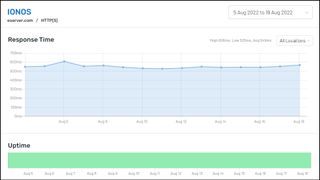
How fast is IONOS?
Every web host promises lightning speeds, but do they really deliver? To find out, we sign up for a shared hosting plan, set up a simple website using a standard WordPress template, then use some of the best testing and monitoring services around to see exactly how it performs.
Uptime.com checks our site’s availability by accessing a test page every five minutes for fourteen days. IONOS scored a perfect 100% uptime, meaning our site was available for every visit. However, it’s worth noting that IONOS’s advertised uptimes are different; 99.9% for VPS and shared hosting, and 99.98% for WordPress hosting.
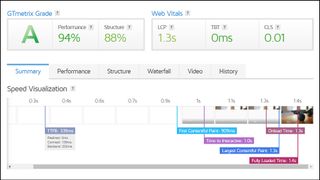
Next, GTmetrix accessed a test page and calculated how long it took to display the main content, a value technically known as Largest Contentful Paint, or LCP. The lower the LCP, the quicker your pages are likely to appear in the browser, and the happier your visitors are likely to be.
IONOS’ LCP was a disappointing 1.3 seconds, placing it 13th out of our last 15 tests (most providers scored between 0.6 to 0.8 seconds). That’s not a disaster – 1.3 seconds is still an acceptable time – but it’s noticeably slower than many competitors.
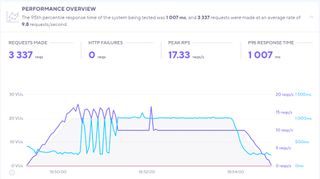
Measuring the best possible load times for a single user is important, but it’s also useful to know how a site performs when it’s really busy. We check for this by using the stress-testing service k6 to unleash 20 visitors simultaneously and monitor what happens.
IONOS scored poorly here, too, with our site averaging only 9.8 requests per second (most providers manage 14 to 16). If you’ve a low-traffic site and are unlikely to have 5 simultaneous users, let alone ten, that also might not matter very much. But again, it’s a noticeably worse performance than many competitors.
(Please note, our results are based on the performance of the IONOS Business shared hosting plan. If you’re opting for the Expert plan, VPS or dedicated hosting, you’ll get far more system resources and may see very different speeds.)

How easy is IONOS to use?
Log into many web hosts and you’ll find familiar industry-standard platforms: WHM to manage your accounts, cPanel for all your key website management tasks, Softaculous to reliably install and then manage WordPress. That’s generally good news, partly because they’re top quality tools (which is why they became industry standards), but also because if you’ve any experience of web hosting, you’re likely to know how to use these already.
IONOS ditches all these in favor of its own custom control panels. That has some advantages (it probably saves a pile of cash in license fees, helping IONOS keep its prices low), but it also means even expert users will have to spend some time exploring the system to find the functions they need.
This isn’t as easy as we’d like. Functions aren’t always organized intuitively, and common tasks, such as logging into a WordPress site, took more time to locate than we expected.
IONOS’ website search engine helps a little. Enter ‘WordPress’, say, and it doesn’t just list top WordPress support articles. A ‘Product and Actions’ includes control panel tasks such as ‘Install WordPress’, and clicking these links takes you directly to that page. It’s a good idea but doesn’t quite work everywhere. We tried to find the right keywords to show a WordPress newbie how they could log into the dashboard, for instance, but never quite managed it.
If you’re an experienced user who makes in-depth use of all kinds of low-level cPanel and other features, this could easily be an issue. Even once you’ve found the functions you need, there’s no guarantee they’ll deliver precisely the same results.
But if you’re only after the hosting management basics – configure your domain, set up some email addresses, install WordPress – then this may not matter very much. Sure, it might take you a few extra minutes to master the control panel basics, but after that you’ll use IONOS much like any other host.

What is IONOS support like?
IONOS offers support via its website knowledgebase, phone, live chat and email. The support site ‘Help Center’ has a huge number of articles, sensibly organized into categories such as WordPress, Email, Domains, Hosting, Online Marketing, My Account, SSL Certificates, and loads more. Some of these articles are a little short, but there’s a lot of valuable information here.
Unusually, telephone support doesn’t simply mean ‘dial this international number and be left on hold wondering what this is going to cost.’ You can book an appointment and have the company call you. When we tried this at 12:10pm, the site offered us 15-minute slots from 1pm, so you probably won’t have to wait for too long to get a response. However, if that’s not convenient, you can book up to four days ahead from 8am to 8pm.
We set up an appointment, and sure enough, a call arrived within 30 seconds of our starting slot time. The agent listened carefully to our query about installing WordPress on subdomains, clearly explained what we needed to do, and sent us links with more advice via email. Impressive.
There are 14 different phone numbers on offer by IONOS, all belonging to different countries around the globe. Furthermore, if you click on the country’s name – Germany, for example – the entire support site, including all the help articles, load in German. This is really good.
If you prefer live chat or email, they also work well, with speedy and accurate replies quickly pointing us in the right direction.
Final verdict
IONOS cuts a few corners with its shared hosting plans (no free migration, only one email account, below-par performance), but they’re still great value. If you need more, there’s a wide range of WordPress plans, and the company has rock-solid VPS, dedicated, and cloud hosting products to cater to everyone, from enthusiastic amateurs to SMB and enterprise users.
There’s also a handy and feature-rich website builder on offer, plus startups and small businesses have the option to benefit from IONOS experts, who will build a professional online store or website for them.
Sign up for 1&1 Ionos US deals here.
Sign up for 1&1 Ionos UK deals here.
IONOS FAQs
What payment types does IONOS support?
IONOS accepts payment by card and PayPal.
Does IONOS offer refunds?
IONOS has a general 30-day money-back period covering most hosting products and a handful of other services (check the small print for the precise details).
Domains, SSL certificates, cloud and bare metal servers are not included.
Does IONOS have an uptime guarantee?
IONOS has a 99.99% uptime guarantee for its hosted web pages. If the company doesn’t hit the target, you can claim an account credit to match the real downtime (90 minutes downtime, your account is credited with the cost of 90 minutes hosting).
At first glance, that looks better than most providers, who only offer a 99.9% uptime guarantee. But limiting compensation to the actual downtime isn’t as generous. The top-of-the-range shared hosting plan is $8 a month in the first year, for instance, or $0.263 a day. If your site is down for eight hours, that could be a disaster for you, but even IONOS admits responsibility, you’ll get just $0.09. It’s not even worth your time asking.
ScalaHosting ‘only’ offers a 99.9% guarantee, but if its uptime is less than 99% (that’s only seven hours, 18 minutes and 17 seconds in a month) you’ll qualify for a whole month. That’s still not a huge amount, and it’s best to have no downtime at all, but we like the principle: if the service doesn’t hit a certain standard, you effectively get it for free.
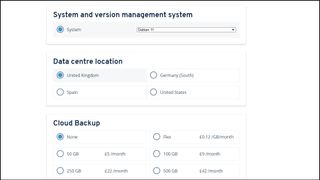
Where are IONOS’s data centers?
IONOS has ten data centers located in the USA, Germany, UK and Spain.
The company allows you to choose your preferred data center for some of its more high-end products. You can’t pick a data center if you’re buying regular shared hosting, for instance, but you do get the option with VPS plans.
What is my IONOS IP address?
Log into your IONOS control panel.
Click Domains and SSL, then find and click your domain in the list.
Click the DNS tab.
Scroll down and look for a record with the type A, the host name @ (or www) and the service ‘Webhosting.’
Your website server’s IP address is displayed in the Value column for that A record.
What are IONOS’s nameservers?
If you sign up for IONOS hosting but are using a domain managed elsewhere, you may need to find IONOS’ nameservers to connect the domain to your hosting plan. Sounds complicated, but fortunately it only takes a few clicks.
Log into your IONOS control panel.
Click Domains and SSL, then find and click your domain in the list.
Click the Nameserver tab and the control panel displays the IONOS nameservers for your account.
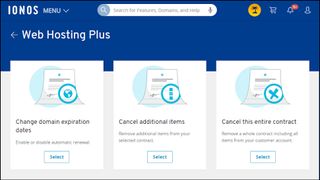
How do I cancel an IONOS product?
Log into the IONOS control panel.
Click the Account icon top-right, and select Contracts & Subscriptions.
Find the plan you’d like to cancel, click the gear icon to its right and choose Manage Contract.
Click ‘Show Cancellation Options’ and decide what you’d like to cancel: an entire contract, or specific add-ons only.
If you got a free domain with your plan and don’t need it, select the ‘Change domain expiration dates’ option to disable automatic renewal.
https://www.techradar.com/reviews/11






